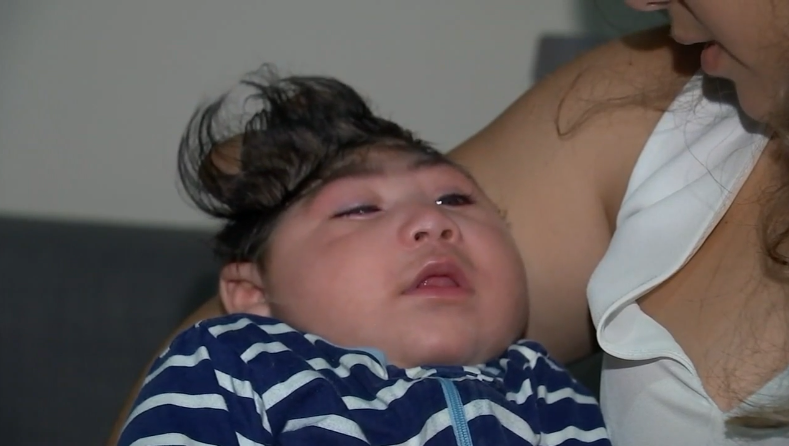Babies diagnosed with fatal conditions are now surviving thanks to the miracles of modern medicine — and a lot of hope and prayers from their families.
Baby Lucas was diagnosed with a fatal brain disorder called exencephaly when his mother was just 10 weeks pregnant, WABC 7 reports. Maria Santa Maria, of Garfield, New Jersey, said doctors recommended an abortion, but she refused.
On the day of Lucas’s birth, she and her husband, Augusto, prepared their daughters to say goodbye to their baby brother, according to CNN. They made funeral plans, and they waited.
But Lucas did not die.
Today, he is 7 months old, and doctors believe he is the only child in the world to survive with exencephaly.
“He’s so unique. Most of the children that are born with this condition die after several hours,” Dr. Tim Vogel with North Jersey Brain and Spine Center told the local news outlet.
He explained that execephaly is a condition where the brain and skull do not form properly. Lucas is missing part of his skull, and his brain is partially exposed.
“The skull doesn’t form so the brain is exposed to the intrauterine environment and usually that causes a lot of damage,” Vogel said.
Maria Santa Maria said they prepared for the worst, making funeral arrangements and talking with their young daughters about their baby brother’s death.
“They always said there was no possibility of him making it,” she said. “I did feel like I was losing him.”
When Lucas was born, the family gathered together in the hospital room to hold him and say goodbye. Apparently, the little baby boy was not ready to leave, though.
Hours passed, and Lucas continued to breathe on his own and eat, according to CNN.
Follow LifeNews.com on Instagram for pro-life pictures and videos.
Here’s more from the report:
That’s when Dr. Tim Vogel, director of pediatric neurosurgery at the North Jersey Brain and Spine Center, suggested surgery. If he could stabilize Lucas and what looked like a water balloon on top of his head, the Santa Marias could bring their son home.
“If he goes home and this fluid sac ruptures, that would be unsurvivable,” Vogel told CNN.
Half of Lucas’ basal ganglia, the part of the brain responsible for sensory-motor integration, hadn’t formed correctly, but the other half had, and was protected.
Luckily, young children have a high capacity for neuroplasticity, or the brain’s ability to adapt to change and relearn. If Vogel removed the damaged part of Lucas’ brain, he said, the functioning part could reassign the damaged area’s duties. The procedure would reduce his likelihood of seizures and further brain damage, too.
Today, Lucas is at home with his family. Vogel said he is doing things other babies at his age would do, like eating cereal and cooing to his mother. He said they plan to continue working with Lucas to develop ways to protect his brain.
“Lucas is going to be with me for a long time,” the doctor said. “Every time I see him, it’s just so encouraging.”
Santa Maria said she thanks God for her son’s life.
“Moms always say, ‘Even if we had him for five minutes, it was all worth it,’” she said. “Thanks to God we got so much more than that.”
Other children thought to have fatal conditions also are alive and fighting in the world today. They include the daughter of U.S. Congresswoman Jaime Herrera Beutler, who was born without kidneys and diagnosed with Potter’s syndrome. Bella Santorum is another. The daughter of former U.S. Sen. Rick Santorum, she has lived with Trisomy 18 for 11 years – defying doctors’ predictions. British child Noah Wall also continues to thrive years after he was born without most of his brain.
Stories like these provide hope for children and their families. They show that there always is hope, and there always is a reason to choose life.









